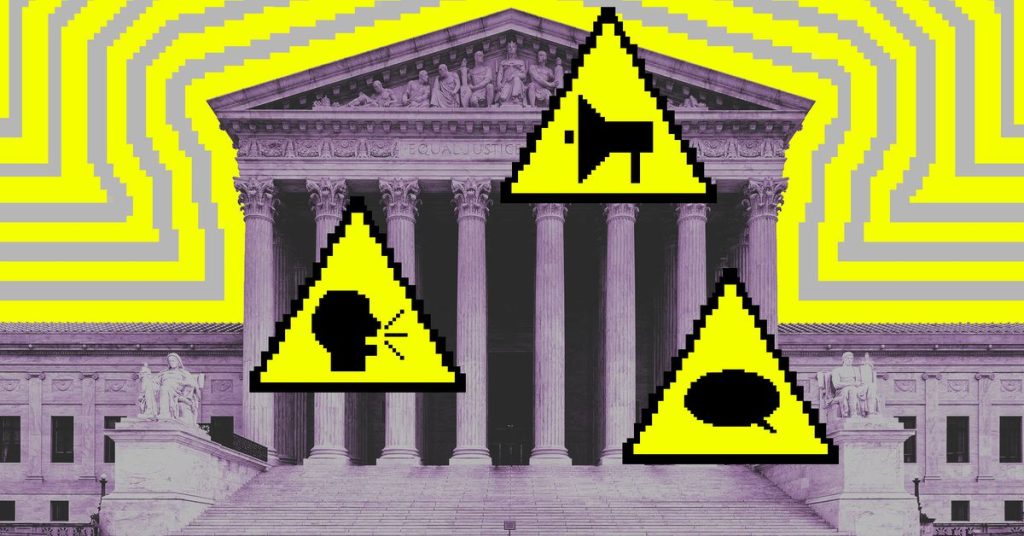Supreme Court to Hear Case on Government Communication with Social Media Platforms
The Supreme Court is set to hear arguments in Murthy v. Missouri on Monday, a case that could significantly impact how social media platforms handle posts containing misinformation, election threats, and other potentially harmful content. The central question is whether the government can flag such posts to social media companies without it being considered unconstitutional coercion of speech, also known as “jawboning.”
Recent Developments and Precedents
This case comes on the heels of the court’s recent decision to temporarily block a lower court order requiring the Biden administration to produce documents related to the “Twitter Files.” The original Missouri state AG’s request for these documents was initially granted, but later narrowed in scope. The Supreme Court then lifted limits on the administration’s communications while considering the case.
Two key Supreme Court precedents likely to be discussed during the arguments are Bantam Books v. Sullivan and Blum v. Yaretsky. In Bantam Books, the court ruled that a Rhode Island commission effectively coerced book distributors to suppress certain works through intimidation. Blum v. Yaretsky established a standard for determining when the conduct of a private actor can be considered state action, making them liable for acting at the government’s behest.
Potential Implications for Government-Platform Communication
If the court agrees with the state AGs that the Biden administration inappropriately communicated with social media companies, it could severely limit the ability of government officials to work with platforms in the future. Additionally, social media platforms themselves may be hesitant to reach out to the government for information verification, fearing liability if they are seen as acting on the government’s behalf.
The US Chamber of Commerce cautioned the court against allowing the theory of state action to be used to punish private entities, arguing that any remedy should involve restraining the government rather than further limiting the rights of coerced private parties.
Balancing Interests and Crafting a Careful Standard
Various interest groups have submitted amicus briefs urging the court to carefully consider the potential impact of its ruling on their work. For example:
- A bipartisan group of current and former election officials emphasized the importance of being able to communicate with social media platforms to share accurate voting information and address threats and intimidation.
- The nonpartisan Election Protection coalition expressed concern that a ruling for the states could endanger the right to vote by hindering information sharing between civil society, government, and social media companies.
- The Reporters Committee for Freedom of the Press warned against creating an overly broad standard of coercion that could chill the free flow of information from government sources to the news media and enable burdensome fishing expeditions.
- Medical groups, including the American Medical Association (AMA), asserted the government’s compelling interest in combating vaccine misinformation, while the conservative-oriented Association of American Physicians and Surgeons (AAPS) argued that accepting this assertion would green-light government censorship.
Industry groups like NetChoice and the Computer and Communications Industry Association (CCIA) called for a clear rule to prevent governments from compelling platforms’ speech or preventing content moderation through informal coercion. They also asked the court to clarify that digital services are not state actors and cannot be held liable for the government’s actions.
Looking Ahead
The Supreme Court’s decision in Murthy v. Missouri, expected around June, will help determine the extent to which the Biden administration can notify social media platforms about potentially concerning content. This ruling could affect the safeguards these companies have put in place around misinformation and may change the kind of flags and warnings users see on posts across the internet, just months before the November elections.

4 Comments
Oh, looks like the lines between free speech and regulation are getting blurrier by the minute!
Isn’t it about time? Guess we’ll finally see where the boundary really lies between regulation and freedom online.
Buckle up, the internet’s wild west era might just be getting some new sheriffs in town.
Talk about a power play; let’s see how this shakes up our feeds!